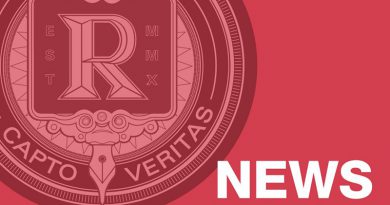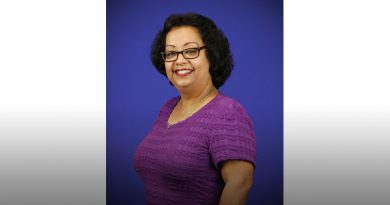Sign Language Interpreters Key To Hearing Impaired Students’ Classroom Learning
Lori Mulrooney-Martinez attends four classes a week at Miami Dade College Kendall Campus. She hears lectures on philosophy, computers, statistics and ESOL.
In all the classes she does not sit facing the instructor, she’s right up in the front of the room gesturing energetically and quietly mouthing back the lecture. She is a sign language interpreter for deaf and hearing impaired students.
Interpreters are offered for hard of hearing students all across MDC campuses. There are three main hubs where interpreters get sent from: Wolfson, North and Kendall Campus. At Kendall Campus, Mulrooney-Martinez is one of the seven American Sign Language interpreters who work both part-time and full-time. The interpreters work with more than a dozen students out of the A Comprehensive Center for Exceptional Student Services or ACCESS disability services.
Kendall Campus ACCESS services coordinator Jose Urrego said the office provides the service for 25 students this semester.
“They receive services from sign language interpreting, advisement, note taking and other services as well,” Urrego said.
North Campus ACCESS serves 31 hearing impaired students this semester. They say it is double the number from last semester. Wolfson Campus ACCESS serves 10 students.
Mulrooney-Martinez began signing 18 years ago and has been an interpreter for 15. During a recent interview at ACCESS Services with Mulrooney-Martinez and deaf education student Laura Vargas, the two smiled often at each other. Their hands were in constant motion during the conversation.
“My senior year in high school I took a sign language class because someone told me it was an easy A,” Mulrooney-Martinez said. “Best thing I ever did. I picked it up quickly and really learned from the deaf community.”
She started studying at MDC when she was 18-years-old as a student taking non-credit courses. She was involved with the note taker program that ACCESS offers.
“I asked the coordinator for the hard of hearing department if I could take notes for deaf students so that I could watch the interpreter and meet some deaf students at the same time,” said Mulrooney-Martinez.
Mulrooney-Martinez has been interpreting for Laura Vargas for the last ten years.
“I started working with Laura at Southwest High School from her freshman to senior year,” said Mulrooney-Martinez. “And then since she’s been at MDC.”
Vargas started at MDC in 2010 majoring in education.
“I want to be a teacher. I want to graduate with an AA degree and go as a teacher’s aide,” Vargas said. “Probably work for a year and then go get my masters in education for elementary school.”
Vargas goes to class from 8 a.m. to 12 p.m. There are accommodations for the hard of hearing students, but there’s no special treatment or extra help.
“I’m just like a regular student,” Vargas said. “I go to class, the teacher lectures and I do have note takers that come with me to class and take notes for me.”
There are other accommodations for hearing impaired students in their classes.
“If we’re watching a movie, there’s close captioning,” Vargas explained.
Vargas is taking two classes this semester and hopes to graduate by summer of 2016.
“I think I’m going to finish next summer, I hope,” Vargas said. “If I pass biology.”
Aside from biology, Vargas says that learning new vocabulary is the biggest challenge inside the classroom because Vargas may not know the correct sign to go with the new term.
“You have to sometimes come up with different signs in the classroom,” Vargas said. “Sometimes there’s not really a sign that goes along with that particular word.”
Mulrooney-Martinez is constantly learning. As technology changes and new technologies emerge, she said sign language has to mold to the changes
“The more technical the class the more creative you have to get with your signs,” Mulrooney-Martinez said. “English has a lot of words and sign language has a conceptually accurate sign for every word but not as many.”
Hard of hearing students do not only face challenges in the classroom but also socially.
At North Campus, Jessica Besu is one of the dozen hard of hearing students that ACCESS provides services for. She said her disability presents challenges outside of the classroom.
“Sometimes people tend to look down upon me,” Besu said, a graphic design student at North. “I tend not to mind them.”
Students like Besu and Vargas appreciate the communication bridge the interpreters provide.
“Miami Dade College is committed to ensuring students are successful in their academic pursuits,” said Andrea Plunkett, ACCESS services director at North Campus. “Students who are deaf and hard of hearing are entitled to receive services.”




